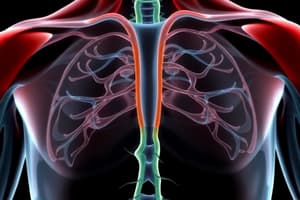Podcast
Questions and Answers
ما الذي يتميز به الغدد الصماء من حيث نقل تأثيرها؟
ما الذي يتميز به الغدد الصماء من حيث نقل تأثيرها؟
- تحتاج إلى اتصالات فيزيائية مباشرة
- تعتمد على اتصالات عصبية لنقل تأثيراتها
- تفرز الهرمونات مباشرة في الجهاز الهضمي
- تنتقل تأثيراتها عن بعد دون الحاجة لاتصالات فيزيائية مباشرة (correct)
ما هي الخلية الهرمونية التي يصعب دراسة وظائفها بسبب نوعيتها المختلطة في الأنواع المختلفة؟
ما هي الخلية الهرمونية التي يصعب دراسة وظائفها بسبب نوعيتها المختلطة في الأنواع المختلفة؟
- الخلايا البارانورونية
- الخلايا الأبوية
- الخلية الجذعية
- الخلايا الكرومافينية (correct)
أي من هذه الغدد ليست من فئات الغدد الصماء وفقًا للوصف؟
أي من هذه الغدد ليست من فئات الغدد الصماء وفقًا للوصف؟
- الغدة المشيمية (correct)
- الغدة الدرقية
- الغدة الكظرية
- الغدة النخامية
ما هو دور الخلايا الأبوية التي توجد أساسًا في الغدد الصماء؟
ما هو دور الخلايا الأبوية التي توجد أساسًا في الغدد الصماء؟
ما هي علاقة خلايا الكرومافين ببقية أنواع الخلايا؟
ما هي علاقة خلايا الكرومافين ببقية أنواع الخلايا؟
أي من هذه ليست من فئات الغدد الصماء وفقًا للتقسيم التقليدي؟
أي من هذه ليست من فئات الغدد الصماء وفقًا للتقسيم التقليدي؟
ما هي الأمراض التي يمكن أن تؤثر على الجهاز الهرموني وتؤدي إلى اضطرابات في إنتاج الهرمونات وإطلاقها؟
ما هي الأمراض التي يمكن أن تؤثر على الجهاز الهرموني وتؤدي إلى اضطرابات في إنتاج الهرمونات وإطلاقها؟
كيف يتم تنظيم إنتاج الهرمونات داخل كل غدة؟
كيف يتم تنظيم إنتاج الهرمونات داخل كل غدة؟
ما هي وظيفة الغدة النخامية؟
ما هي وظيفة الغدة النخامية؟
لماذا تعد الغدد الصعترية والدرقية مختلفة في وظائفهما على الرغم من شبه تكوينهما الكيميائي؟
لماذا تعد الغدد الصعترية والدرقية مختلفة في وظائفهما على الرغم من شبه تكوينهما الكيميائي؟
كيف يؤثر تغير عوامل مثل الشيخوخة على عمل الهرمونات؟
كيف يؤثر تغير عوامل مثل الشيخوخة على عمل الهرمونات؟
لماذا من المهم فهم التفاعل المعقد لهذه الغدد في أجسامنا؟
لماذا من المهم فهم التفاعل المعقد لهذه الغدد في أجسامنا؟
Flashcards are hidden until you start studying
Study Notes
Endocrine Glands Overview
Endocrine glands are a group of specialized tissues scattered throughout our bodies that synthesize hormones into our bloodstream. These small organs secrete chemicals called endocrine hormones directly into the bloodstream, which allows them to affect all parts of the body remotely without needing physical connections between cells, like neurons do with synapses. They play a crucial role in regulating growth, energy levels, reproduction, breathing, digestion, sleep, moods, stress response, memory, heart function, and more. Let's explore some key aspects of these fascinating structures.
Types of Endocrine Cells
There are three main types of endocrine cells: chromaffin cells, paraneuronal cells, and parenchymal cells. Chromaffin cells can transform into other cell types when stimulated by certain compounds, while paraneuronal cells lack a clear structure. Parenchymal cells are found mainly in endocrine glands and produce hormones meant for secretion. However, chromaffin cells rarely occur in pure form in various species, making it difficult to study their functions.
Classification of Endocrine Glands
According to tradition, there are four major classes of endocrine glands—pituitary, thyroid, parathyroid, and adrenal gland—and several minor classes such as pineal gland, hypothalamus, ovaries, testes, thymus, islets of Langerhans, and corpora lutea. Each major class produces specific sets of hormones, some of which have similar chemical compositions but different effects on the human body. For example, the pituitary gland secretes multiple kinds of hormones involved in metabolism regulation, growth, lactation, and the menstrual cycle, among others. In contrast, the thyroid and adrenal glands primarily focus on producing thyroxine and glucocorticoids respectively.
Hormone Production Regulation
Hormone production within each gland is regulated through feedback mechanisms involving specific receptor proteins. This ensures that homeostasis is maintained even under dynamic conditions where factors such as aging may change how well hormones work. Additionally, the concentration of hormones produced varies depending on the time of day and age.
Impacts of Diseases and Conditions
Disease and condition states can affect the endocrine system, leading to imbalances in hormone production and release. Examples include diabetes mellitus from dysfunctional insulin and cortisol release due to Addison’s disease, both of which affect carbohydrate and electrolyte balance, respectively. Other examples involve disorders related to thyroid hormone deficiency or excess, or issues arising from abnormalities in the hypopituitary area of the brain.
In summary, endocrine glands are vital components of our physiology, playing essential roles in maintaining balance across numerous bodily systems. Their unique ability to influence distant target sites via circulating hormones highlights their importance in overall health. Understanding the complex interplay of these glands can help us appreciate the intricate network of communication occurring within our own biological systems.
Studying That Suits You
Use AI to generate personalized quizzes and flashcards to suit your learning preferences.




